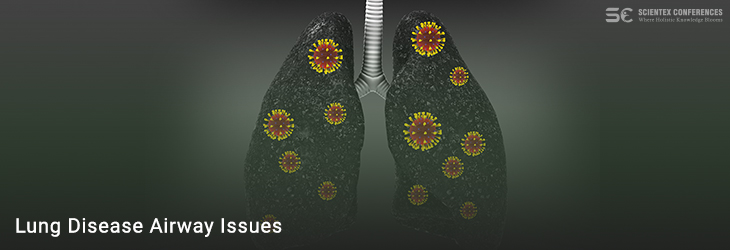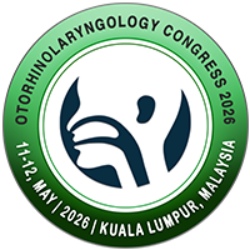Track: Lung Disease Airway Issues

Session Overview:
This session aims to provide a comprehensive exploration of lung diseases and airway issues, focusing on their pathophysiology, diagnosis, and management strategies. Given the increasing prevalence of respiratory conditions globally, understanding these diseases is critical for healthcare providers across various disciplines. A significant portion of the session will be dedicated to diagnostic advancements in lung disease. Participants will learn about the latest imaging techniques, including high-resolution computed tomography (HRCT) and positron emission tomography (PET) scans, as well as emerging biomarkers and genetic testing that can aid in precise diagnosis and personalized treatment approaches. By the end of this session, attendees will have a deeper understanding of the complexities of lung diseases and airway issues, equipping them with the knowledge to implement the latest evidence-based practices in their clinical settings. This comprehensive overview aims to enhance the quality of care for patients with respiratory conditions and promote ongoing advancements in the field of pulmonary medicine.
Recent Developments:
Recent advancements in the understanding and management of lung diseases and airway issues have significantly enhanced patient outcomes and treatment strategies. This evolving field is characterized by breakthroughs in diagnostic techniques, novel therapeutic approaches, and a greater understanding of disease mechanisms. Telemedicine has also gained traction as a vital tool in managing lung diseases, particularly during the COVID-19 pandemic. Remote consultations and monitoring have enabled healthcare providers to deliver care while minimizing exposure risks. This shift has proven effective for follow-ups and management of chronic conditions, improving access to care for patients in remote or underserved areas. Advancements in diagnostic imaging have revolutionized the approach to lung disease. High-resolution computed tomography (HRCT) scans and innovative imaging techniques allow for earlier detection of conditions like interstitial lung disease and lung cancer. Furthermore, the integration of artificial intelligence (AI) in radiology is enhancing the accuracy of diagnoses and risk stratification. The exploration of genomic and molecular biomarkers has also provided new insights into the pathophysiology of lung diseases, enabling personalized treatment strategies. Understanding genetic predispositions can help clinicians tailor therapies to individual patients, improving treatment outcomes.
Sub Tracks:
Chronic Obstructive Pulmonary Disease (COPD):
This sub-track will focus on the latest research and management strategies for COPD, including the role of pulmonary rehabilitation, new pharmacological treatments, and approaches to reducing exacerbations. Discussions will also cover the impact of comorbidities and the importance of a patient-centered care model.
Asthma:
Explore recent advancements in asthma management, including the use of biologics and targeted therapies for severe asthma. This sub-track will highlight new diagnostic tools, such as fractional exhaled nitric oxide (FeNO) testing, and the role of asthma education in improving patient outcomes.
Interstitial Lung Disease (ILD):
Examine the diverse spectrum of ILD, including idiopathic pulmonary fibrosis (IPF) and other forms of interstitial lung disease. This sub-track will cover diagnostic challenges, emerging treatment options, and the importance of multidisciplinary care in managing these complex conditions.
Obstructive Sleep Apnea (OSA):
Investigate the latest developments in the diagnosis and management of OSA, including the use of continuous positive airway pressure therapy, positional therapy, and surgical interventions. Discussions will also focus on the relationship between OSA and other chronic conditions, such as cardiovascular disease and diabetes.
Pulmonary Embolism (PE):
Focus on the latest insights into the prevention, diagnosis, and treatment of pulmonary embolism. This sub-track will cover advancements in imaging techniques, risk stratification, and the role of anticoagulation therapy in managing acute and chronic PE.
Lung Cancer:
Delve into recent advancements in lung cancer diagnosis, staging, and treatment. Topics will include the impact of targeted therapies and immunotherapies, the role of liquid biopsies in early detection, and the importance of personalized medicine in improving patient outcomes.
Alpha-1 Antitrypsin Deficiency:
Explore the implications of alpha-1 antitrypsin deficiency on lung health, including its role in the development of emphysema and liver disease. This sub-track will cover recent research on gene therapy, augmentation therapy, and the importance of early diagnosis and management in affected individuals.
Pathophysiology and Disease Mechanisms:
Explore the underlying mechanisms of COPD, including inflammation, oxidative stress, and airway remodeling. This section will discuss the role of environmental factors, such as smoking and air pollution, in disease progression.
End-of-Life Care and Palliative Approaches:
Address the considerations for end-of-life care in advanced COPD, including palliative care options, advance care planning, and symptom management to enhance the quality of life for patients and their families.
Current Research and Future Directions:
Explore ongoing research efforts and future directions in COPD management, including novel therapeutic approaches, the potential role of gene therapy, and the impact of emerging technologies in monitoring and treating the disease.
Scientific Highlights
- Anatomical and Physiological Disorders of ENT
- Lung Disease Airway Issues
- ENT Infections and allergies
- New treatment Advances in Otolaryngology
- Ear & Nose plastic surgery
- Endoscopic and laparoscopic ENT surgery
- Craniofacial & Facial surgery
- Otology and Neurotology
- ENT Microsurgery
- COVID 19 and ENT
- Pediatric Otolaryngology
- Speech and Swallowing Disorders
- Head and Neck Surgery
- Airway Management & Surgery
- ENT Allergies & Immunotherapy
- Surgical Techniques in ENT
- Nasal Polyposis and Biologic Therapy
- Advances in Cochlear Implants
- Recent Advances in Otorhinolaryngology
- Vertigo and Balance Disorders


